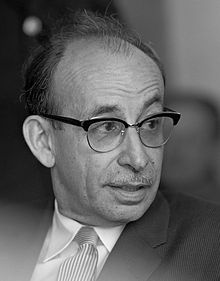Raúl Roa García
Raúl Roa García (born April 18, 1907 in Havana ; † July 6, 1982 ibid) was a Cuban politician and long-time foreign minister .
biography
Roa began to be politically active at an early age and was elected to the student council in 1930. In 1931 he was arrested for activities directed against the government of President Gerardo Machado and, as his opponent, joined the revolt led by Fulgencio Batista in 1933, which ultimately led to the fall of the Machado government in August 1933. However, he later became an opponent of Batista during his first presidency between 1940 and 1944 and had to flee to the United States after participating in a failed general strike against Batista's government .
During his exile there he was involved in the organization of the Cuban Revolutionary Society. After Batista's first term ended, he returned to Cuba in 1944, where he was director of culture in the government of President Carlos Prío from 1948 to 1952 . With the beginning of Batista's new presidency in 1952, he again went into exile for the next seven years.
After the victory of the Cuban Revolution on January 1, 1959, sealed by Batista's flight , Roa was appointed Foreign Minister to the Cuban Council of Ministers by Prime Minister Fidel Castro and held this office for more than 17 years until 1976. Isidoro Malmierca Peoli , a member of the Central Committee, was succeeded as Foreign Minister of the Communist Party of Cuba (PCC) and editor-in-chief of the party newspaper "Granma" .
As foreign minister, Roa was a promoter of the Cuban- Soviet alliance. Despite his disdain for US foreign policy , however, he played a leading role in the negotiations of two important agreements between Cuba and the US. First of all, the 1965 agreement sanctioned the previous departure of Cuban emigrants to the USA. In 1973 the two states agreed another agreement that forbade both of them to indict air and sea pirates for theft , illegal entry or other crimes in the countries where they landed.
Most recently he was Vice President of the National Assembly ( Asamblea Nacional del Poder Popular ) and a member of the State Council between 1976 and 1981 .
The training center of the Cuban Foreign Ministry, the Institute for International Relations, in Instituto Superior de Relaciones Internacionales “Raúl Roa García” was named in his honor.
Web links
| personal data | |
|---|---|
| SURNAME | Roa García, Raúl |
| ALTERNATIVE NAMES | Roa, Raúl |
| BRIEF DESCRIPTION | Cuban politician |
| DATE OF BIRTH | April 18, 1907 |
| PLACE OF BIRTH | Havana |
| DATE OF DEATH | July 6, 1982 |
| Place of death | Havana |
